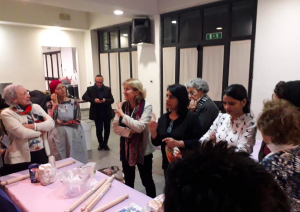NEWS Invited by UCEI, women from different origins knead bread together
Women from various cultural and religious identities and traditions accepted the invitation of the Union of Italian Jewish Communities, together with the Interreligious Table in Rome and the Italian Jewish Center Il Pitigliani, to meet and knead bread together.
Symbol of traditions and sharing, bread has always been the main element on humanking’s tables. It is the food that bring people together in everyday life, at parties and in ritual celebrations. These were the premises for the event, organized with the aim of launching a message of peace, dialogue and vitality entirely declined for women.
Participants prepared the challah, the Jewish bread for Shabbat, but also the bread of Indian, Yemeni and Moroccan tradition.
“Different traditions were on the stage together, each one teaching something and at the same time learning something by someone else. It was a different way of being together,” said Noemi Di Segni, president of the Union of Italian Jewish Communities. “We managed to have a nice evening. We shared recipes and baking process. Bread spreads a good smell in our homes, gives meaning to our being together”.
On the same wavelength was Maria Angela Falà, president of the Interreligious Table in Rome, who said: “It was an evening of great joy, interest, exchange. I am very happy about the initiative, also because it is characterized by something authentically concrete. In fact, for real dialogue talking and discussing is not enough, action is required. And this is what we did today and we took home”.
Bread as an element of encounter and dialogue. This theme was also at the center of a day held in January in Bologna, organized by the Italian Jewish Medical Association. Several scholars and rabbis participated in it. Rosanna Supino, president of the association, reminded those present: “Bread represents the dawn of civilization. It was to make bread that humans learned to become permanent farmers and to domesticate wheat. Today the wide variety of bread also derives from the symbolic meaning in folklore, religion, culture and politics of different ethnic and religious groups”.

